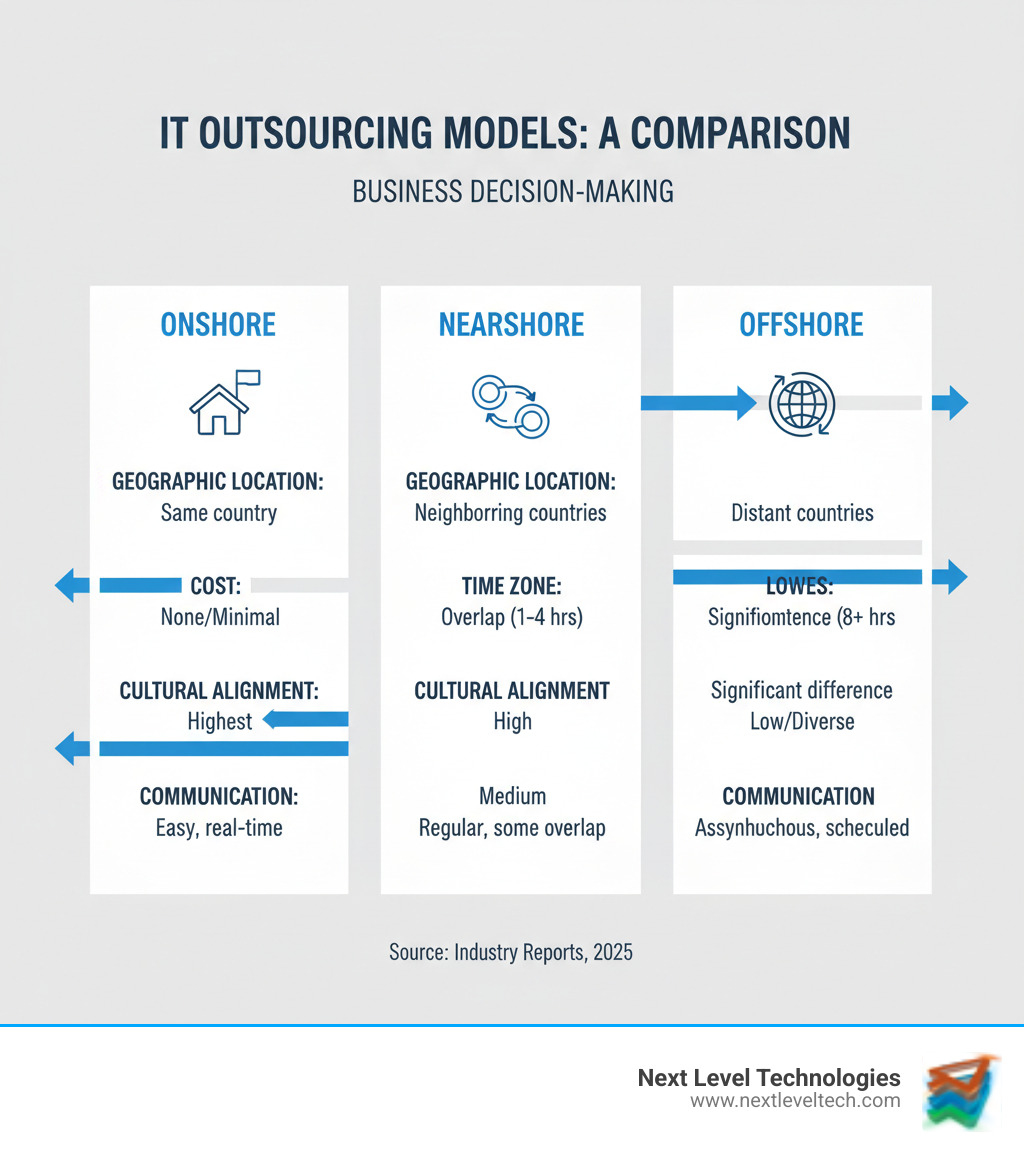The World is Your Workforce: Exploring Offshore and Nearshore IT Services
October 31, 2025

Unlock digital excellence with expert computer hardware and networking services. Secure your business, boost productivity, and future-proof your IT.
February 11, 2026

Unlock predictable IT costs, always have the latest tech, and boost efficiency with Hardware as a Service. Transform your business today!
February 10, 2026

Find the best Remote IT Support Business for your small business. Learn how to define needs, evaluate providers, and secure your tech.
February 6, 2026
October 31, 2025
Offshore IT outsourcing is the practice of hiring third-party service providers in foreign countries to handle your organization's technology needs, from software development to cybersecurity management. The key benefits are compelling: up to 70% reduction in labor costs, access to a global pool of specialized talent, round-the-clock productivity, and the ability to scale teams rapidly.
Commonly outsourced services include software development, IT support, cybersecurity, cloud infrastructure, and quality assurance. The numbers tell a powerful story: an impressive 92% of the world's top 2000 companies depend on IT outsourcing for their daily operations. The cost advantage is clear when US software engineers earning $115,000-$171,000 annually are compared to their counterparts in countries like Vietnam, who earn four times less.
But offshore IT outsourcing is more than a cost-cutting measure; it's a strategic move to access a global workforce that accelerates innovation and boosts efficiency. As President of Next Level Technologies, I've spent over 15 years helping mid-sized businesses in Columbus, Ohio, and Charleston, WV, steer complex technology decisions. Through my experience, I've seen how the right IT strategy—whether local or global—can transform a business.

Outsourcing means contracting business functions to external providers who can do the job better, faster, or more cost-effectively. It's a strategic cornerstone for companies worldwide, with the global business process outsourcing market expected to reach $525.2 billion by 2030. But where you outsource is as important as what you outsource, leading to three distinct models.
Offshore IT outsourcing involves partnering with a service provider in a distant country, often on another continent. For example, a business in Columbus might hire a development firm in India. This model thrives on cost arbitrage—accessing skilled professionals at significantly lower costs. It also opens up a massive global talent pool and enables a "follow-the-sun" model, where work continues around the clock, dramatically speeding up project timelines.
Understanding offshore IT outsourcing is clearer when compared to its geographic cousins. Each model offers distinct advantages.
| Feature | Onshore Outsourcing | Nearshore Outsourcing | Offshore Outsourcing |
|---|---|---|---|
| Location | Within the same country | Neighboring country or same time zone | Distant country, often different continent |
| Cost | Highest (similar to in-house) | Moderate savings | Lowest cost (significant savings) |
| Time Zone | Same or minimal difference | 1-3 hours difference | Often 6+ hours difference |
| Cultural Alignment | High (shared customs, business norms) | Moderate to high | Moderate to low |
| Communication | Easiest (face-to-face meetings) | Relatively easy | Requires careful planning |
Onshore outsourcing keeps work domestic, offering high cultural alignment but minimal cost savings. Nearshore outsourcing is a middle ground, like a US company partnering with a team in Mexico, providing moderate savings with manageable time zone differences. Offshore outsourcing offers the greatest cost reduction but requires more planning for time zones and cultural differences.
Many IT functions are ideal for outsourcing to improve efficiency and reduce costs.
By delegating these functions, businesses can free up internal teams to focus on core growth initiatives.
At Next Level Technologies, we see offshore IT outsourcing as more than a cost-cutting tactic. After 15 years of working with businesses in Columbus, Ohio, and Charleston, WV, I've seen how a global IT strategy can transform operations. It opens doors to scalability without massive investment, innovation from fresh perspectives, and a focus on core business drivers.

Offshore IT outsourcing delivers impressive cost savings, with the potential to reduce labor costs by up to 70%. A US-based software engineer can cost over $115,000 annually, while an equally skilled developer in a country like Vietnam may earn four times less. This isn't just about salaries; it also means reduced operational expenses and lower infrastructure investment. You gain access to affordable expertise without the overhead of traditional expansion.
The IT talent shortage is a real challenge. Companies often struggle to find local developers with specialized skills in AI, blockchain, or other emerging technologies. Offshore IT outsourcing solves this by providing access to a massive global talent market, with millions of IT experts in regions like Eastern Europe and Latin America. This allows you to overcome local talent shortages and bring in experienced developers with niche expertise.
The "follow-the-sun" model is a genuine game-changer. When your local team in Ohio ends their day, your offshore team can pick up the work. This round-the-clock productivity leads to faster project delivery and improved performance. For customer-facing services, it enables continuous support without the high cost of overnight shifts. When combined, cost savings, global talent, and 24/7 operations open up potential you never knew you had.
While offshore IT outsourcing offers incredible opportunities, it's not without challenges. Based on my years helping businesses in Columbus and Charleston, I've learned that success depends on understanding and mitigating risks upfront. Proper due diligence turns potential roadblocks into manageable issues.

The biggest challenges are often human, not technical. Language and cultural differences can lead to misunderstandings. Different work cultures approach hierarchy, feedback, and deadlines differently, which can create friction. Time zone coordination also requires careful planning to enable real-time collaboration. These issues can be managed with regular video calls, clear documentation, and taking time to understand each other's work styles.
Moving IT operations offshore introduces new legal and security considerations. This is where our extensive cybersecurity training at Next Level Technologies is crucial for our clients. Intellectual property (IP) protection is a major concern, as you're entrusting proprietary code to a team in a country with different laws. Data privacy regulations like GDPR and CCPA add complexity, and a breach can destroy customer trust. Cybersecurity threats also multiply with every new access point. The solution is to approach partnerships with strong contracts, comprehensive security audits, and robust Service Level Agreements (SLAs) that are non-negotiable.
Ensuring quality from a distance is a common worry. Without direct supervision, how do you know if work meets your standards? Ensuring code quality and monitoring performance become more challenging. The key is to be deliberate about processes. Detailed project specifications, regular milestone reviews, transparent reporting systems, and explicit quality guidelines are essential. At Next Level Technologies, we know that successful IT partnerships—local or global—depend on clear communication, defined processes, and mutual accountability.
An offshore IT outsourcing journey demands strategic planning and meticulous vendor selection. The best outcomes come from a well-thought-out approach, where performance is clearly defined and continuously monitored. It's not about being hands-off; it's about being smart about how you lead.

Finding the right partner is about more than the lowest price; it's about finding a team that shares your vision. Your vetting process should be thorough. Research providers, check reviews, and look beyond the surface to understand their technical and cybersecurity expertise. At Next Level Technologies, we emphasize that any partner must demonstrate robust security protocols, backed by staff with extensive cybersecurity training. Cultural fit also matters, as alignment on communication and work styles prevents future headaches.
Top destinations have earned their reputations. India remains a leader in digital change, as noted in the 2023 Tholons Global Business Innovation Sustainability Index. The Philippines excels in voice services, while Ukraine and Poland are strong European hubs. Malaysia is a rising star with high English proficiency. Consider time zones, costs, and the business environment when choosing.
Success hinges on crystal-clear processes. Your contract must be comprehensive, detailing the scope of work, deliverables, and Service Level Agreements (SLAs). Use project management tools like Jira or Asana for visibility and accountability. Establish a rhythm of regular communication through scheduled meetings to build trust and catch issues early. Detailed documentation in straightforward language is also critical to minimize misunderstandings.
Technology makes global collaboration feel seamless. According to Deloitte's research on top digital enablers, certain technologies significantly improve business processes. Cloud platforms like Google Workspace and Microsoft 365 create a unified workspace. Automation boosts efficiency and reduces errors. For larger organizations, a single-instance ERP system ensures data consistency. Finally, invest in secure communication channels. Our extensive cybersecurity training at Next Level Technologies informs our guidance to clients on selecting tools that protect their business interests.
Offshore IT outsourcing can feel like uncharted territory. After 15 years of advising businesses in Columbus, Ohio, and Charleston, WV, I've heard nearly every question. Let's address the most common ones.
The savings can be substantial, with businesses realistically saving up to 70% on labor costs. However, it's crucial to consider the total cost of ownership. While direct labor costs drop, you'll have additional expenses like management overhead to coordinate across time zones and initial onboarding. Always watch for hidden fees in contracts and invest in robust quality assurance. Despite these factors, cost reduction remains a primary driver, especially for small businesses seeking to save time, access resources, and gain expert help.
Software and application development is the most common, with a striking 79% of companies outsourcing these projects. This includes everything from custom apps to enterprise software. IT support and help desk services are also popular, as outsourcing makes 24/7 coverage affordable. Other frequently outsourced services include network management, cybersecurity, and cloud services, often driven by a need for specialized expertise or internal capacity constraints.
Data protection is critical, a topic our team takes seriously given our extensive cybersecurity training. A multi-layered security approach is key. Start with robust contracts that include clear data ownership, confidentiality, and NDA clauses. Thoroughly vet your vendor's cybersecurity measures, including certifications like ISO 27001 or SOC 2. Technically, ensure all data is encrypted and use strict access controls with multi-factor authentication. Your partner must also comply with regulations like GDPR and CCPA. Finally, conduct regular security audits. Outsourcing work does not outsource your responsibility for cybersecurity risk management. At Next Level Technologies, our staff's training is designed to help businesses steer these critical decisions.
The decision between global and local IT support isn't one-size-fits-all. Offshore IT outsourcing offers compelling advantages, including cost savings up to 70%, access to specialized talent, and 24/7 productivity. However, these benefits come with challenges like cultural differences, communication problems, and significant security risks. Protecting your intellectual property and data requires a security-first approach from the start.
At Next Level Technologies, we've spent over 15 years helping businesses in Columbus, Ohio, and Charleston, WV, steer complex IT decisions. Our team's extensive cybersecurity training and technical experience show that the right strategy is about finding what works for your specific needs and risk tolerance.
While we focus on providing comprehensive managed IT services, we understand that some businesses thrive with offshore partnerships, while others prefer the control and peace of mind of local support. What matters most is that your IT partner—whether global or local—understands your business, shares your commitment to security, and provides the expert guidance you deserve.
If you're weighing your options or seeking a trusted local partner to build a resilient IT ecosystem, we're here to help. We believe in making IT simple, reliable, and secure, so you can focus on what you do best.
Explore comprehensive managed IT services and support with Next Level Technologies, and let's discuss how we can propel your business forward with confidence.
Unlock digital excellence with expert computer hardware and networking services. Secure your business, boost productivity, and future-proof your IT.
February 11, 2026
Unlock predictable IT costs, always have the latest tech, and boost efficiency with Hardware as a Service. Transform your business today!
February 10, 2026
Next Level Technologies was founded to provide a better alternative to traditional computer repair and ‘break/fix’ services. Headquartered in Columbus, Ohio since 2009, the company has been helping it’s clients transform their organizations through smart, efficient, and surprisingly cost-effective IT solutions.
